Reviews 2016-17
Wed 5th Oct. 2016
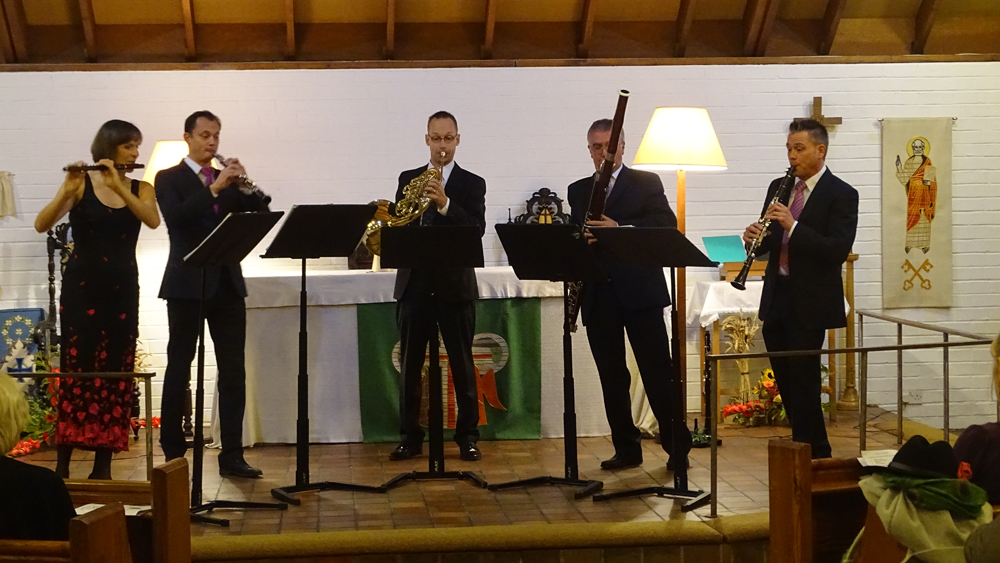
Anemos Wind Ensemble
For the first concert of the 2016/7 season on October 5th at St Peter's we welcomed the Anemos Arts Ensemble. This is a Wind Quintet made up of members of the Brabants Symphony Orchestra from the Netherlands. This made the exact line up difficult to predict for the Programme Notes. I suspect the Horn player was not Cleo Simmons! Earlier in the day they had performed Prokofiev's Peter and the Wolf for some 300 P6 and P7 pupils from Capshard and Torbain Primary Schools, which was greatly enjoyed by the children.
For the evening concert they started with a Divertimento by Haydn or possibly one of his pupils. The surprisingly familiar slow movement turned out to be the St Anthony Chorale, which is believed to be the source of Brahms' Variations. Written about the same time, Franz Danzi's Wind Quintet Op 56 No 2 was played next. Danzi wrote nine Wind Quintets, but although he wrote many other works including Operas and Symphonies, only the Quintets are played now. This is a great pity if this delightful piece is typical of his work.
The first half ended with an arrangement of Ravel's Le Tombeau de Couperin. This was written in memory of the Baroque composer Francois Couperin. The individual movements have Baroque titles, but Ravel's style is certainly not Baroque. The Oboist, Sander Teepen introduced all the items in the first half with great knowledge and humour. The playing and ensemble work was of the highest standard.
After the interval we heard an arrangement of the first movement of Mozart's Gran Partita, K361. Originally for thirteen instruments, it sounded fine with just five! The Bassoonist Alan Pendlebury introduced Samuel Barber's Summer Music, adding to the information in the Programme Notes. Although the start of the piece sounds like a hot, sultry summer's day, Alan thought it was meant to represent indolence.
The final piece on the programme was Jacob Gade's Tango Jalousie. Great fun, the piece was familiar but the composer's name less so. An encore of a tango arrangement of themes from Beethoven's 5th brought the evening to an exciting conclusion.
Wed 9th Nov, 2016
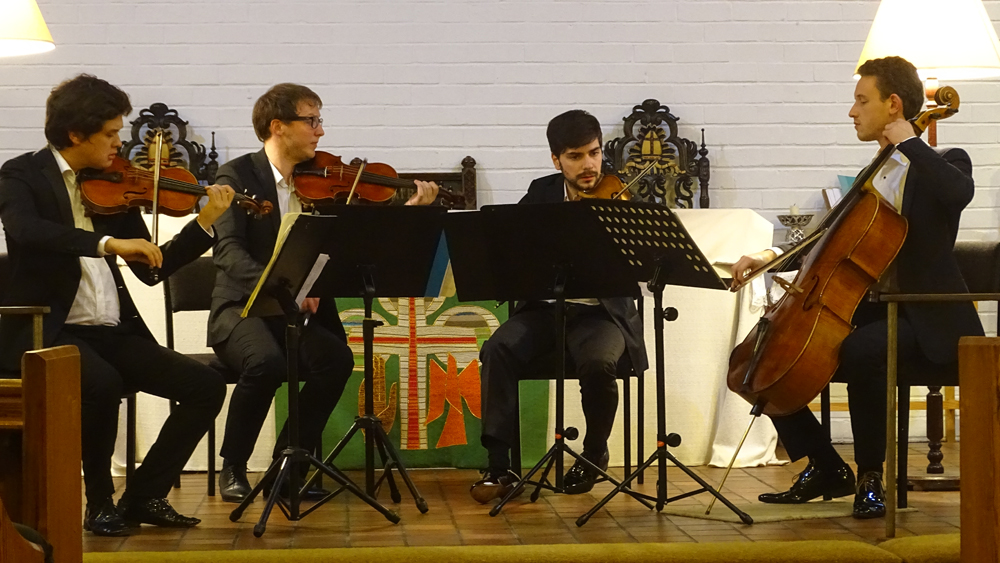
Van Kuijk
Since coming together just four years ago the Paris based Van Kuijk Quartet have had a run of successes in international competitions and have already performed in major venues across Europe. Over the years, one of the attractions of Kirkcaldy Music Society has been the chance from time to time to hear performers at an early stage in their careers, who go on to earn world wide acclaim. On the basis of their sparkling performance in St Peter's Church on 9th November the young Van Kuijk Quartet can look forward to a glittering career.
The multiple, complex demands of their chosen programme, all by French composers, would challenge any quartet anywhere. In St Peter's they gave a performance which was brilliant throughout and at times totally spellbinding. In the first movement of Ravel's String Quartet in F major they delicately introduced two intertwined themes, which resonate in the second movement, but with dramatic pizzicato introducing contrasts in pace, which the quartet soared through.
Through the melodious slow third movement they moved into the fourth, in which the themes of the first return, but dynamically changed and delivered by the Van Kuijk with a driving force which brought a breathtaking climax. Every one of Kurtag's contemporary Six Moments Musicaux makes its own distinct technical demand, or demands! of the performers. They involve transformation from pieces composed for other instruments, live electronics, or even the delicate dynamics of birdsong, as well as occasionally evoking passages of literature. Startling individual technique along with total mutual understanding are called for throughout and the Quartet were more than equal to the challenge.
In Debussy's String Quartet in G minor, like the Ravel, the initial themes are carried through to the conclusion with a startling variety of tempo and technique. A syncopated opening passage engages the listener, who is then carried on through the movements with delicate melodic passages at times working against dexterous pizzicato and with changes of pace and mood which are full of surprises. The Quartet were in command throughout, eventually accelerating to a conclusion which pinned the audience to their seats. At any moment through the whole recital any weakness of technique would have been ruthlessly exposed.
The complex elements of all the pieces could easily have lapsed into confusion without the superb control and coordination the Quartet maintained from start to finish. It was an exuberant virtuoso performance which will live in the memory, all for a fraction of the ticket price the Van Kuijk Quartet will soon command in international concert halls.
Wed 7th Dec. 2016
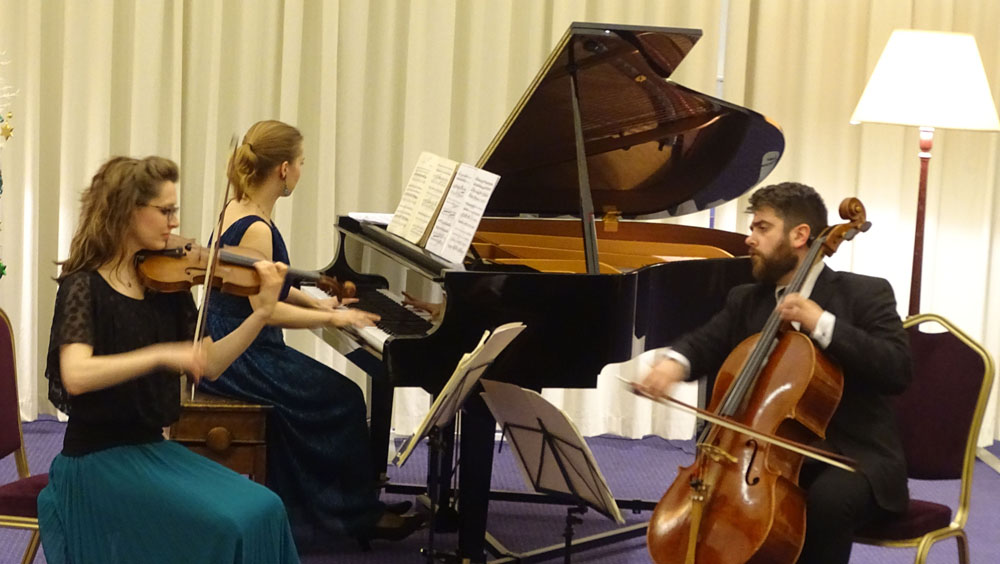
Kapten Piano Trio
On Wednesday 7th December, KMS welcomed the Kapten Piano Trio to the Old Kirk. They formed in 2011 at the Royal Conservatoire while studying for their Master's Degrees. Pianist Kristi Kapten from Estonia studied at the Estonian Academy of Music. Violinist Rachel Spencer, from Yorkshire, studied at the Conservatoire and at the Guildhall and Cellist Duncan Strachan, brought up in the west highlands, read music at Oxford.
The programme order was changed to give better balance, Rachel introducing Sally Beamish’s Piobaireachd. Sally, although unable to attend, had provided programme notes and featured our concert on her website. The Pibroch, part of the Highland bagpipe tradition, is a set of variations on a slow theme and this piece, where the variations get increasingly ornate, is dedicated to piper Annie Grant. The technical demands of this piece were skillfully dealt with by the Trio. Ravel’s Trio was introduced by Kristi.
We are having a feast of Ravel this season with the Quartet in November influenced by Cesar Franck and Debussy, his Violin Sonata No 2 to be heard in January, influenced by American Jazz and this Trio influenced by the Far East and the Basque Region. Again the high virtuosic demands of the piece were easily met by the Kapten Trio.
After the interval, which included a raffle of wonderful prizes of food, drink, hair styling, adventure days and other goodies, the Trio returned for a performance of Schubert’s Trio D929 introduced by Duncan. This monumental piece, performed on New Year’s Day 1828, the year of his untimely death, was one of the very few of his works Schubert heard performed. The music has great depth of emotion from profound to light hearted. Indeed, Stanley Kubrick used music from the slow movement in his film Barry Lyndon to express what dialogue couldn’t convey. In this performance there were many wonderful solo performances including amazing piano runs as well as tight ensemble work, finding a wide range of colours in the music.
What the future holds for this group is unknown. It is not easy making a living as a Piano Trio. Duncan already plays in the Maxwell String Quartet, Kristi regularly performs across the UK and Estonia and Rachel also performs as a soloist and chamber musician across the UK. Whatever the future of the Trio, individually they are assured of a bright future.Concert has not talen place yet.
Wed 18th Jan. 2017
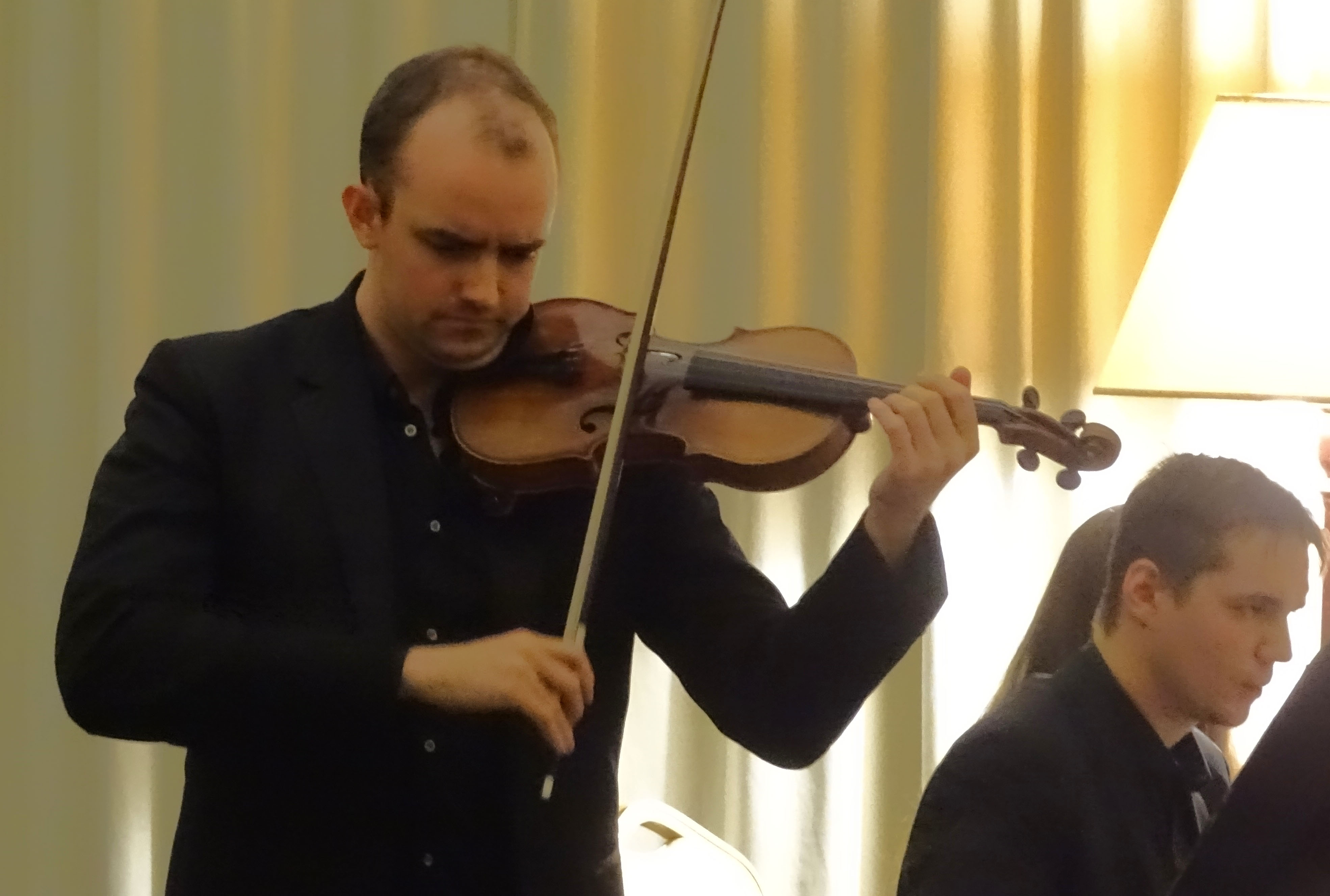
Benjamin Baker(violin) Daniel Lebhardt(piano)
By the end of 2016, the Music Society's season had already delivered an exceptional sequence of concerts. If there was any question about whether the brilliant run could continue, Benjamin Baker and Daniel Lebhardt answered it when they opened 2017 with a highly charged virtuoso performance. As solo performers they have both achieved distinction as multi-award winners. Together, they have created an intimate partnership in which they are totally at ease with one another as they move between and through passages of delicate subtlety and surging dynamism. It was an exciting evening for an enthralled audience.
Benjamin Britten's Suite for Violin and Piano challenges the versatility and dexterity of any performers who attempt it. Britten is playing games with traditional forms: march, moto perpetuo, lullaby and waltz. Within each movement we recognise the familiar elements throughout, but as Benjamin Baker said in his witty commentary, they are cleverly dismantled and reconstructed as they go along and do not end where they began. It made for a heady mix, with both players moving through the rapid changes of pace and mood with exquisite fingerwork and an apparently telepathic sense of one another. By the time they reached the flamboyant finale the audience were captivated.
Ravel's Sonata for Violin and Piano broke new ground in the nineteen twenties by including a central Blues movement. Jazz was just becoming popular in Paris at the time and Ravel was an early pioneer in fusing jazz and traditional elements. An indication of how challenging the piece can be is that in the American premiere the violinist's bow became stuck between the strings because he was unprepared for the sheer pace of Ravel's tempo. Benjamin Baker had no such problem—the greater danger at times might have been his bow catching fire, especially in the driving rhythms of the final movement—but the duo remained totally in control of the dynamic shifts throughout.
Beethoven's great “Kreutzer” Sonata starts with a slow, solo violin section which is suddenly overtaken by a surging “presto” . Dramatic changes of pace and mood recur throughout the three movements, posing severe physical demands as well as calling for extreme virtuosity from both players—which they again delivered superbly. The concluding “presto” movement provided a rich final flourish, received with rapturous applause.
Baker and Lebhardt had put together a programme of enormous scale and complexity and their whole performance was a triumph.
Wed 22nd Feb. 2017
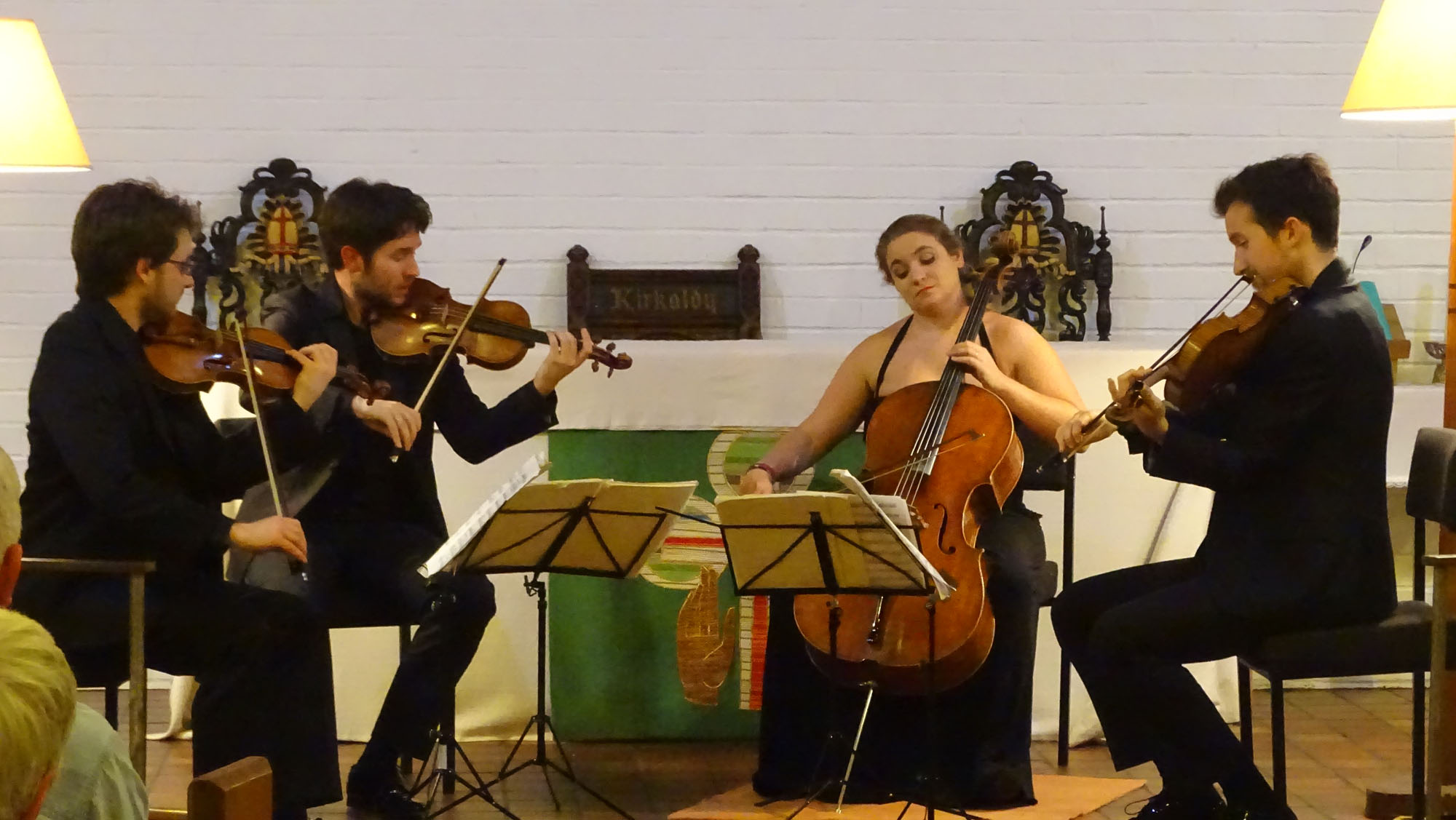
Piatti String Quartet
On February 22nd, Kirkcaldy Music Society welcomed the Piatti String Quartet to St Peter’s Church. Sadly this is the last concert KMS will hold there as it moves permanently to the Old Kirk next season. The Piatti formed when studying at the Royal Academy of Music and take their name from the 19th century cello professor at the Academy, Alfredo Piatti.
Their programme consisted of two slightly neglected quartets and two pieces unfamiliar to most of the audience. They started with Haydn’s Op 20 No 2 Quartet. In this Op 20 set the cello is given much greater prominence and the opening cantabile demonstrated the wonderful tone of Jessie Ann Richardson’s 1741 Cello made by Celoniatus. This was followed by Turina’s Bullfighter’s Prayer. Turina had witnessed toreadors praying in a chapel prior to facing the bulls and this inspired the piece, contrasting the tumult of the arena with the devotions of the toreadors. This is a beautiful piece, well worth getting to know.
Before the interval the Piatti played the other short work, Anton Webern’s Langsamer Satz (Slow Movement). Webern is better known for atonal music of great difficulty, but this is a work firmly in the Romantic tradition. Its mood is similar to his teacher Schoenberg’s Transfigured Night written some 6 years earlier. The intensity of the romanticism and the languorous beauty of the music took the audience by surprise and there was a buzz amongst the audience during the interval. The quartet returned to play Brahms’ Quartet Op 51 No 1. His Quartets have enjoyed less popularity than some of his other music, and that is a great pity. This powerful and relentless music deserves more hearings.
The Piatti impressed the audience with their seemingly effortless performance. During the concert the audience were told Steve Doman plays a fine contemporary viola by Melvin Goldsmith, Michael Trainor plays a 1783 Gagliano/Voller Violin and Nathaniel Anderson-Frank plays a violin by G. Cappa made in 1682.
Wed 22nd Mar. 2017
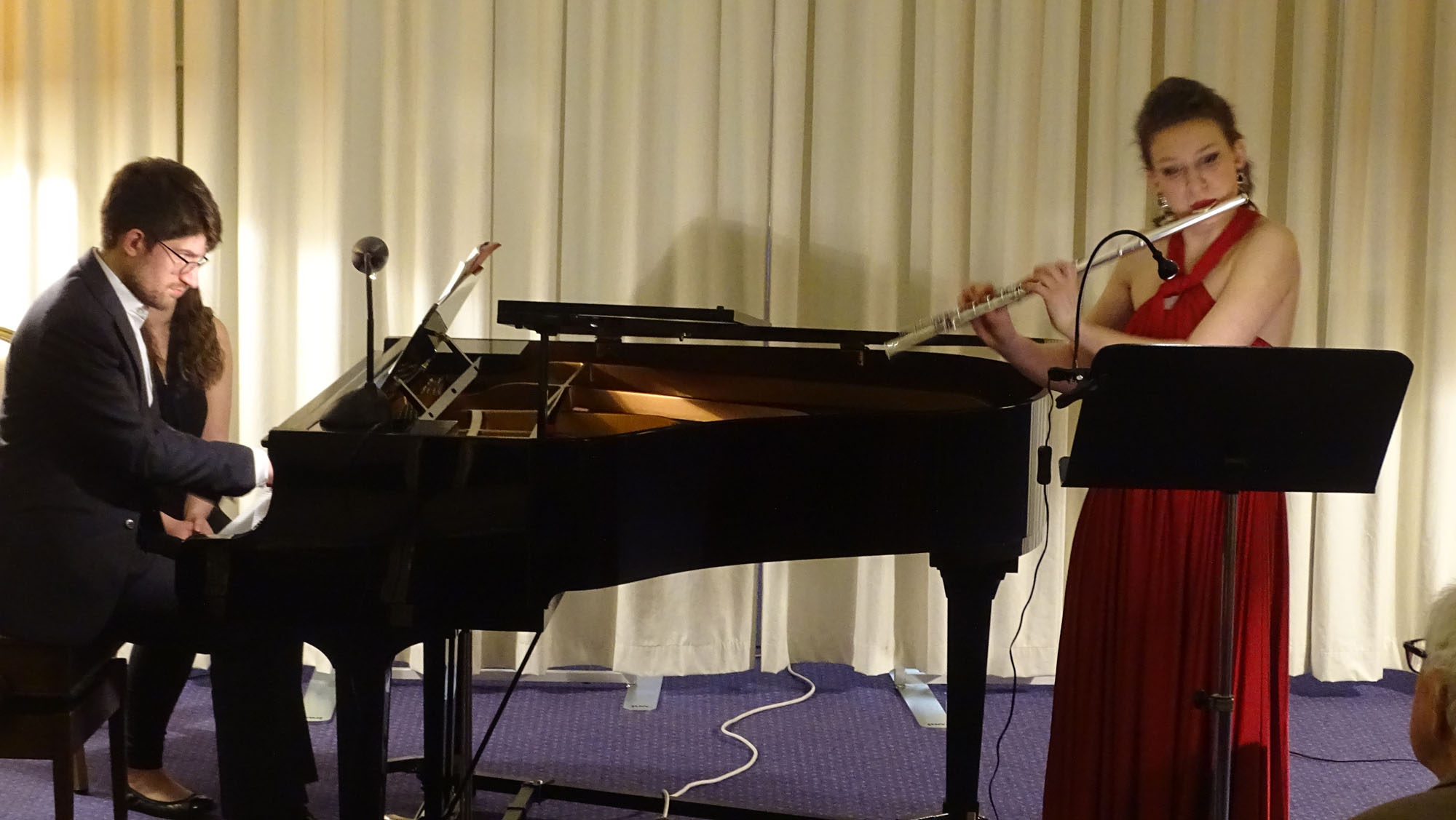
Ter-Berg/Nicholson(flute/piano)
Rosanna Ter-Berg (flute) and Leo Nicholson (piano) are two of Britain's rising stars, charismatic performers who together and separately enjoy performing in a variety of musical contexts from cabaret to concert hall. In the Old Kirk on Wednesday 22nd March they enthralled their audience with a cleverly conceived programme which interwove pieces from the 19th century French golden age of the flute, through to startling contemporary works.
In the first half, opening with Ibert's “Jeux” the duo sensitively brought out the contrasting moods and colours of its “Anime” and “Tendre” movements. Poulenc's “Sonata” is a twentieth century classic which is one of the best known in the repertoire, but familiar though it may have been to many in the audience, the duo's exquisite performance had a delicate and subtle control of its variations which made it seem fresh and new. Joliver's “Chant de Linos” from the mid-twentieth century was a dramatic contrast, with its turbulent, raw, emotional content. The opening half ended with a solo by Ter-Berg of Ian Clarke's “Zoom Tube.” Clarke is a leading composer in the contemporary flute world, determined to stretch the potential of the instrument to its utmost limits. Ter-Berg seized the opportunities the piece offers in a breathtaking performance, full of startling effects, which electrified the audience.
After the interval Casella's “Sicilienne and Burlesque” brought the duo together again, with Nicholson's sensitive playing illuminating the flute's colouration of the contrasts between the two movements. Franck's great “Sonata” was the concluding piece on the programme and the duo played through the movements with the utmost delicacy in the tenderly emotional moments, balanced by their powerful expression of the grand passions, to a richly celebratory conclusion.
After such a consummate performance of a big and challenging programme, taking on some of the greatest works in the repertoire, it would have been too much to expect an encore. But Ter-Berg and Nicholson delivered two, by Ravel and Clarke, to the audience's delight.
This recital completed our series of 6 for 2016-17; however the society is delighted to be able to provide an extra performance and a real treat. Two distinguished quartets, the Aurea and Gildas, are combinng forces to play the Mendelssohn String Octet and two sextets, This will be one of only 3 performances in Scotland and our normal ticket price of £12 must be a real bargain. The recital is in the Old Kirk, Kirk Wynd Kirkcaldy at 7.30 on Wednesday 5th April. Tickets from committee members or at the door. Do not miss it!.
There will also be our AGM and concert on Wednesday 19th April when Mairi Rolland will accompany soprano Erin Spence.
Wed.5th April 2017
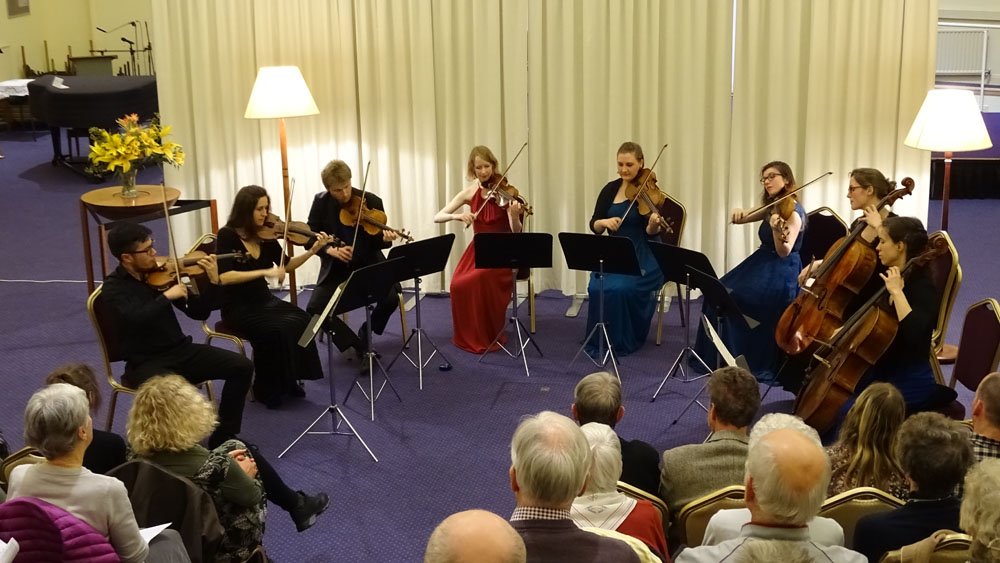
Special Octet Concert
For this special concert, Kirkcaldy Music Society were delighted to have the opportunity to welcome the Aurea and Gildas String Quartets as part of their mini tour of Scottish music clubs.
We had heard both Quartets in previous seasons and eagerly awaited the chance to hear these young, vibrant musicians again, playing together in Mendelssohn’s glorious String Octet. The concert started with the Violins of the Aurea Quartet and the two Violas and Cellos in Strauss’ Sextet from Capriccio. This beautiful, romantic piece builds to a passionate climax and the six players combined to bring out all the emotion of the piece.
Roles were reversed for the next piece with the Violins from the Gildas Quartet and the two Violas and Cellos in Korngold’s Sextet Op 10. This was written when he was just 19, an amazingly assured and mature work for one so young. The slow movement is brooding and sombre but the mood is lifted in the Intermezzo with its bouncy rhythms. The fourth movement races along joyously to a glorious conclusion.
These pieces were unfamiliar to most of the audience, not easy to take in with one hearing. They were rewarded in the second half with the eight players coming together to play Mendelssohn’s famous Octet. The first movement starts with a soaring melody on the Violins. The Andante seems less familiar to me than the other movements, perhaps because it is the least celebrated, though it presents an intriguing range of feelings. The Scherzo is a typical scurrying Mendelssohn Scherzo, beautifully controlled by the players.
The Finale takes off at breakneck speed, with elements of fugue as a homage to Mendelssohn’s beloved Bach, and this exuberance carries the work to its glorious end. Written at the age of 16, it is an amazing achievement. Christine Anderson had introduced the Korngold, saying how much they had enjoyed playing together, and this was evident in the high quality of their performance. They are having another wee tour of Scotland in November. We had a request to suggest a recording of the Octet which we were glad to do, but I would be satisfied with a recording of the night if it was available.
Financially the concert was a great success. Thanks for that must go to our audience of an amazing 100, and to those who so generously sponsored the event.
Wed 19th April. 2017
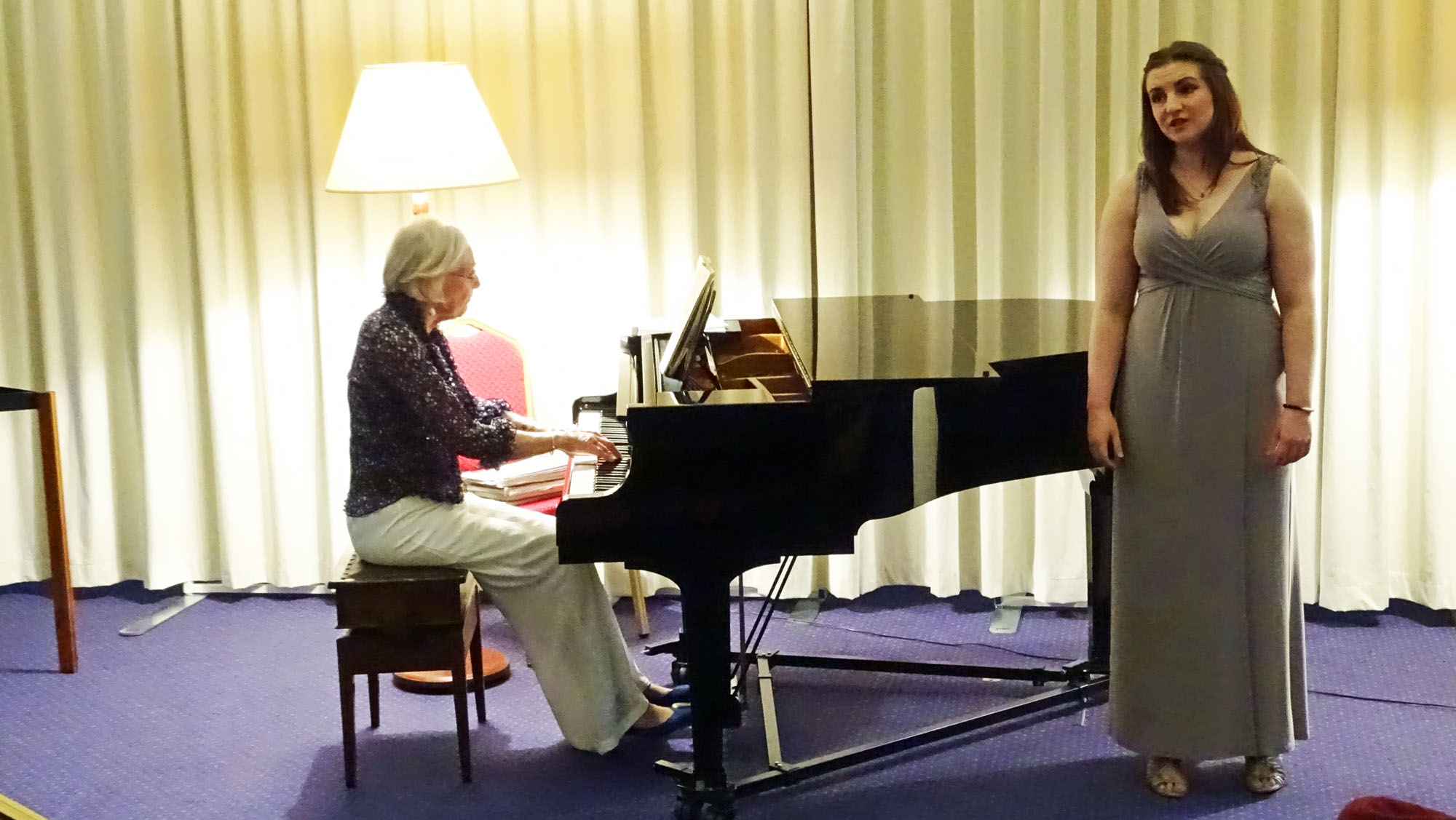
AGM Concert
On Wednesday 19th April, Kirkcaldy Music Society held its AGM Concert in The Old Kirk. After the Minutes of the 2016 meeting were read and approved the Treasurer presented the accounts which showed a healthy surplus, partly due to the generosity of sponsors of the extra Octet concert. The Chairman then reviewed the past season in which we had wonderful concerts from: the Anemos Arts Wind Ensemble who also put on a performance of Peter and the Wolf for local primary Schools, the Kapten Piano Trio, two String Quartets, Ben Baker and Daniel Lebhart, Violin and Piano, and a striking performance from young Flautist Rosanna Ter-Berg accompanied by Leo Nicholson. We had taken the opportunity to stage an extra concert with the Aurea and Gildas String Quartets coming together to include the glorious Mendelssohn Octet. The Secretary outlined the plans for next season.
A recital by the young Fife Soprano Erin Spence accompanied by her teacher Mari Rolland followed the meeting. Erin was a prize winner at the 2015 Fife Festival of Music and is now in her second year at the Conservatoire. She presented a program divided into, usually, three pieces starting with Lieder, Schumann’s Die Lotusblume, Schubert’s Du Bist wie ein Blume and Richard Strauss’ Das Stern. Operatic arias followed with Handel’s Piangero, Care Selve, and Tormani. These will be part of Erin’s assessment at the Conservatoire.
Folk songs followed, The Green Cornfield and The Blackbird by Michael Head and Music When Soft Voices Die and Love’s Philosophy by Roger Quilter. Erin then took a break and Mairi played Debussy’s Arabesque No 1. Opera followed with Mozart’s Bati Bati and Puccini’s O Mio Babino. She sang more Folk Songs, an arrangement by Britten of Early One Morning and Betty Foe's arrangement of The Lass of the Low Countrie.
Erin finished the recital with two of my favourite Gershwin songs; “Someone to Watch Over Me” and “Summertime”. This was a first class performance with Erin effortlessly hitting the high notes and displaying a wide range of emotions from anger to coquettishness, ably supported by Mairi’s piano playing. Fife should be proud to have nurtured such talent, and KMS look forward to following Erin’s future career. After warm applause, Cynthia Reekie thanked the performers and also the Chairman for the work she had done throughout the season. A party for all followed, with finger food, wine and juice and plenty of time to chat. It is hoped that the next season, with an even more varied programme, will again be well attended and successful.
